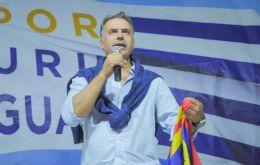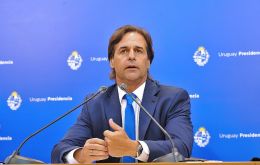MercoPress. South Atlantic News Agency
Tag: Uruguay elections
-
Monday, October 14th 2024 - 10:43 UTC
Swing voters to prove decisive in Uruguayan elections, poll finds

According to a Cifra survey released this weekend in Montevideo, Uruguay has 11% of swing voters who could end up pivotal in Oct. 27's presidential elections. Hence, political parties should focus on winning them over, the pollsters underlined. Cifra Director Mariana Pomiés underlined that this number could tip the scale at the end of the day.
-
Monday, October 14th 2024 - 09:07 UTC
Colorado candidate picks wrong analogy to describe Uruguay's relationship with Mercosur

Colorado Party presidential candidate Andrés Ojeda chose a controversial analogy this weekend to refer to Uruguay's situation within the South American Common Market (Mercosur). He claimed it was affecting his country's credibility not to kill any hostage when hijacking airplanes.
-
Saturday, October 5th 2024 - 10:59 UTC
Survey finds Orsi ahead in voting intention to become Uruguay's next president

According to a Usina de Percepción Ciudadana survey released this week in Montevideo, opposition candidate Yamandú Orsi of the Broad Front (Frente Amplio - FA) would defeat Álvaro Delgado of the ruling Multicolor coalition by 6 percentage points. In case of a runoff, Orsi is expected to garner 50% of the vote, the study found between September 27 and 30 from a sample of 500 people.
-
Monday, July 1st 2024 - 10:55 UTC
Uruguay's internal elections: Delgado, Orsi, and Ojeda to vie for Presidency

Uruguay's internal elections concluded yesterday, confirming Álvaro Delgado, Yamandú Orsi, and Andrés Ojeda as presidential candidates for their respective parties. The elections, held amidst a notably low turnout, saw some unexpected developments, particularly within the Frente Amplio (FA) and the Partido Nacional (PN).
-
Monday, May 6th 2024 - 15:50 UTC
Uruguay: National Party leader arrested for fabricating assault claims against candidate Orsi

In Uruguay, the unfolding saga surrounding the allegations against former Canelones department (province) mayor and current Presidential pre-candidate for the Broad Front (Frente Amplio), Yamandú Orsi, has taken a dramatic turn as Romina Celeste Papasso, a leader of the National Party (Partido Nacional), was arrested on Monday for fabricating false accusations against Orsi. Furthermore, an arrest warrant has been issued for Paula Díaz, the trans woman who initially filed the criminal complaint against Orsi.
-
Thursday, March 14th 2024 - 16:16 UTC
Uruguay: Alleged “operation” against Yamandú Orsi sparks controversy amid assault allegations

The campaign manager for Frente Amplio presidential pre-candidate Yamandú Orsi, Francisco Legnani, has raised concerns over what he calls an orchestrated “operation” against the Uruguayan politician following an alleged assault that occurred in 2014 against a trans woman who filled a complaint this week.
-
Tuesday, March 5th 2024 - 10:30 UTC
Uruguay: FA contenders launch presidential bids

The two main contenders for the primaries of Uruguay's opposition Broad Front (Frente Amplio - FA) have launched their bids to succeed Luis Lacalle Pou at the Executive Tower. To do this, frontrunner Yamandú Orsi resigned as mayor (governor) of Canelones while Carolina Cosse is on leave as mayor of Montevideo until July 8.
-
Saturday, February 17th 2024 - 10:28 UTC
Uruguay: Pepe Mujica says only Yamandú Orsi can beat the Whites

Former Uruguayan President José Pepe Mujica said Friday that he would endorse the presidential bid of Canelones Governor Yamandú Orsi on behalf of the leftwing Broad Front (Frente Amplio - FA) because, although Montevideo Mayor Carolina Cosse is “very good,” she cannot ”beat the Whites (the other name under which the National Party of President Luis Lacalle Pou is known.
-
Friday, March 24th 2023 - 10:46 UTC
IMF explores possible political scenarios with Uruguayan presidential candidates

The annual monitoring mission of the International Monetary Fund (IMF) recently concluded its nearly two-week visit to Montevideo, providing a positive assessment of Uruguay's economy and the government's reform efforts. However, the mission also gauged the pulse of Uruguay's political landscape ahead of the 2024 elections, weekly newspaper Búsqueda informed.
-
Friday, November 11th 2022 - 20:17 UTC
Slight drop in Uruguayan President's approval

Uruguayan President Luis Lacalle Pou of the Multicolor coalition and Montevideo Mayor Carolina Cosse of the opposition Broad Front (Frente Amplio - FA) were both shown to have a 47% approval rating, according to a survey from the Equipos Consultores firm. Disapproval of Lacalle's administration went up from 32% to 36%, it was also reported.
